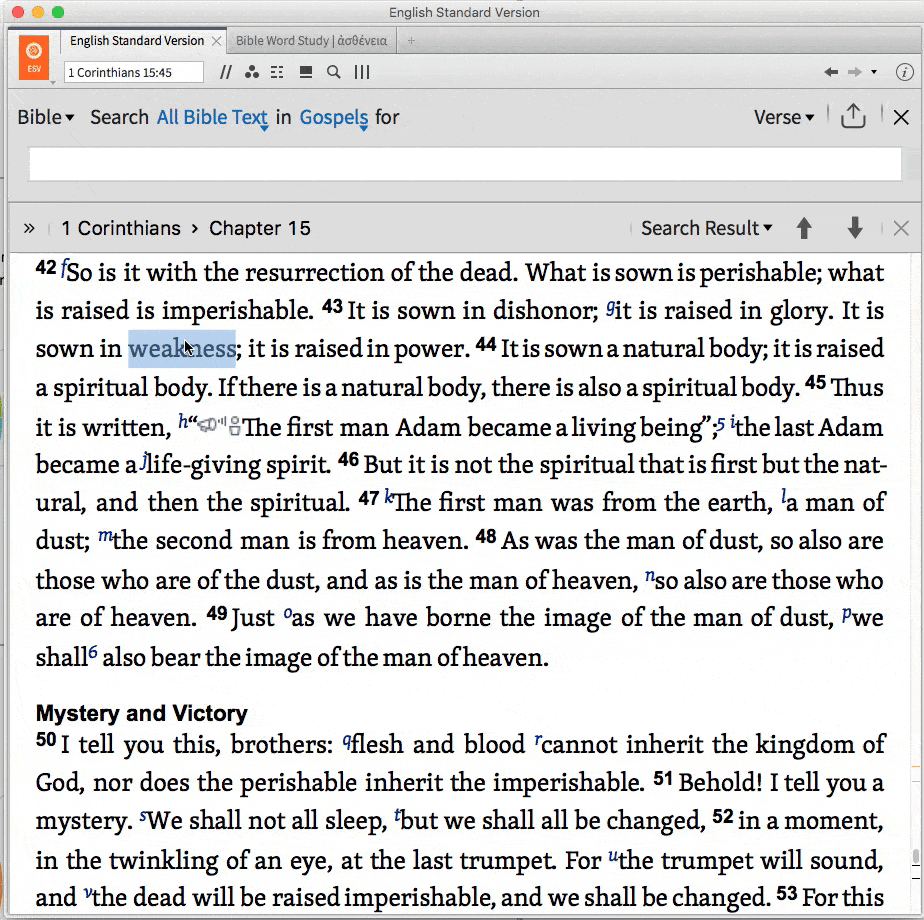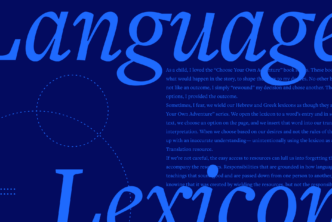I am a member of OLSHA, the Original Languages Safely Handled Association. Our mission—well, okay, my mission (nobody else has yet joined the association)—is to help people who love Scripture but don’t know Greek and Hebrew to use the original languages safely in their Bible study.
You can use them unsafely, of course: check out D.A. Carson’s Exegetical Fallacies to see what I mean.
But the goal of OLSHA is not critique; it’s edification. So let’s focus on the positive and constructive. This very Sunday my pastor made a little point out of the Greek New Testament that I thought was simple, brilliant, and genuinely helpful. It’s also something that anyone with Logos study platform can replicate, whether they know Greek or not.
My church was focusing on the four assertions Paul makes about the resurrection body in 1 Corinthians 15:42–44 (ESV).
- What is sown is perishable; what is raised is imperishable.
- It is sown in dishonor; it is raised in glory.
- It is sown in weakness; it is raised in power.
- It is sown a natural body; it is raised a spiritual body.
My pastor raised the question, what does it mean that the human body is sown “in weakness” (v. 43)?
Stop and think about how to answer this question. There are various legitimate, complementary ways you could go about answering it, and multiple tools in Logos that could help. But I am always asking myself in OLSHA meetings (there’s no one else to ask): “What tools in Logos do I genuinely expect people to use as part of their normal Bible study workflow?” There are countless things you could put in that workflow—if you are a prison inmate with nothing else to do and no toddlers around. But I’m guessing most Logos users are not in that situation. Your time is limited. Which tools will you use all the time, and which ones will you reserve for special situations?
One of the tools you ought to consider using regularly and diligently is the Bible Word Study tool—and it will help you here in 1 Corinthians 15:43. Just right-click “weakness” in the English text, choose the Lemma option on the right, and click Bible Word Study.
This is where the work comes in, because it’s your job to explore the results and determine which ones are significant for our question: “What does ‘weakness’ mean in 1 Cor. 15:43?” In particular, you’ll want to click the translation wheel and survey the passages that come up underneath it.
There is no perfect rule for which cross-references are relevant and which aren’t. They’re all “relevant” in a loose sense—because they all contain the word translated “weakness” (ἀσθένειᾳ, astheneia) in 1 Cor. 15:43. But OLSHA regulations prohibit Bible readers from reading every possible meaning of an original-language word into a single instance of it. Astheneia (ἀσθένειᾳ), for example, is used in the phrase “spirit of weakness” in Luke 13—in other words, a demon caused a woman to be infirm. But this doesn’t mean that demons produce all instances of astheneia in the New Testament in the New Testament. (That’s called “illegitimate totality transfer” in our bylaws—more on this in future posts if you care to check back).
However, I believe my pastor found one cross-reference that provides particular insight. It’s 2 Corinthians 12:10:
For the sake of Christ, then, I am content with weaknesses, insults, hardships, persecutions, and calamities. For when I am weak, then I am strong.
Even without knowing Greek, you can probably guess that the bolded words are translations of the same Greek word found in 1 Cor. 15:43—and the Bible Word Study tool confirms this by highlighting “weaknesses.” And here’s the insight: When Paul sort of recaps in the second sentence what he just described in the first sentence, he uses the word “weak” to summarize “weaknesses, insults, hardships, persecutions, and calamities.” In other words—those are the things in which his weakness consisted. Perhaps, then, Paul has these vulnerabilities in mind when he uses the phrase “sown in weakness” in 1 Cor. 15.
Paul was not a computer; he was a person. He didn’t mean precisely the same thing by “weakness” every time he used the word. (Neither do you: you say you “have a weakness for chocolate” and the next minute you say that you’re “suffering from a weakness in the knee joints”—which, in turn, is different from the metaphorical “weak in the knees”!) Paul may not have had insults and calamities in mind when he wrote of the body being “sown in weakness.” But I think the connection between 1 Cor. 15 and 2 Cor. 12 is a valid one; and I join my pastor and Gordon Fee, the top evangelical commentator on 1 Corinthians, in thinking so. Here’s Fee:
In this case the language has been determined by its present state of ‘weakness,’ a word that particularly recurs in 2 Cor. 10–13 to describe not only the body, but Paul’s whole present existence. (785)
If no commentator in my collection (I have almost 70 on 1 Corinthians) mentioned this textual connection, I would feel much less confident about it. I check these commentators because I respect their skill with the text. But when a commentator with the stature of Fee thinks the connection is valid, I fall safely within OLSHA guidelines.
Want to double the OLSHA ranks? Join me! The first step in OLSHA certification is training, and that’s what the Logos Pros are for. Check out the Logos Pro page for numerous training videos showing you how to use Logos tools to mine exegetical and theological gold without violating OLSHA standards.
***





